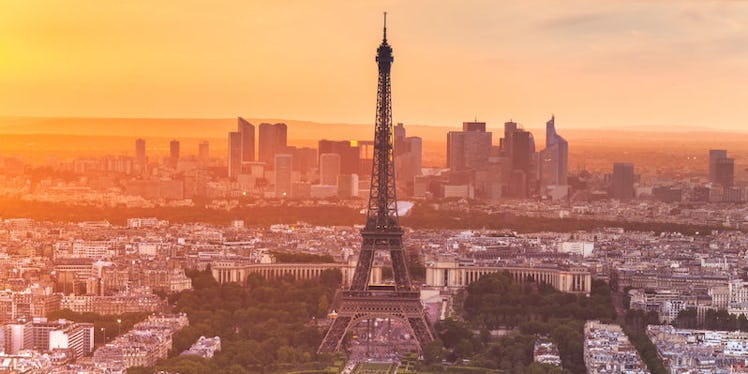
Je Suis Charlie: Reflections On Charlie Hebdo From A French Millennial
Since the Charlie Hebdo massacre, I have felt devastated, dejected and empty. But, it finally came: I had a chuckle. That is what Charlie Hebdo taught me -- to laugh at the tragedy of life.
Laughter is the most powerful weapon. Guns will never silence laughter, love and friendship.
During the march in Paris, the surviving Charlie Hebdo employees' grief was harrowingly palpable. Then, thousands burst into tears of laughter as a pigeon defecated on the French president’s shoulder.
Charlie Hebdo has been an integral part of my life. I wish to go beyond saying #JeSuisCharlie, even though I most definitely am.
Charlie Hebdo is deeply rooted in the French tradition of political satire. Beyond freedom of expression, it's a love of slanderous wit, of insolent and defiant mockery, of juvenile provocation and of permanent rebellion against authority and the establishment.
Charlie Hebdo is the symbol of the 1968 generation, which broke all taboos, ridiculed all authorities and dogmas, and fought for our freedoms.
It lampooned the pompous French political elite, fascists, racists, bigots, the social conventions of the self-serving elite, homophobes, sexists and extremists who falsely claimed to represent their religion.
Satire knows no discrimination, including the lifetime readers of Charlie Hebdo, who were, “Vous, lecteurs salopards!”
I love Charlie Hebdo because it combines poignant satire with investigative and brave journalism. It is a sharp and ruthless mockery of fanaticism and a fight against the perpetrators of the injustices and inequalities of the world.
In fact, that is what cartoons represent -- the innocence in us before we are tarnished by adulthood and the tragedy of life.
The Charlie Hebdo cartoonists and journalists never floundered in the face of tragedy. Instead, they laughed at it and fought it. They were libertarian lefties; although, they ridiculed antimilitarists, ecologists, feminists, pacifists, egalitarians and every political party in sight.
They made their readers question everything and everyone by fostering critical thinking and self-reflection. They sent a message that love and laughter would always prevail over tragedy and cruelty, a message reflected in both editions published after both attacks committed against them.
I've militantly fought as a human rights activist in some of the most war-torn and devastated parts of the world, from West Africa to Iraqi Kurdistan. I've witnessed inhumane horror, pain and death and felt despair and helplessness. I tried to investigate for myself and to shout out loud against these atrocities.
Above all else, I remember and cherish the love, joy and laughs I shared with the people, friends and colleagues I met who suffer on a daily basis and are silenced -- often by death. Laughter and love are such strong weapons in the face of terror and tragedy.
When people without arguments grab their guns and take aim, they do nothing more than reveal their weaknesses.
Most French people did not read the outrageous Charlie Hebdo, but accepted it with stoicism, apart from fundamentalist religious groups and the Front National. It is, most definitely, not to everyone’s liking, and that's fine.
But, the emotional rally behind the #JeSuisCharlie slogan in France showed the solidarity of a country standing against terrorism and standing up for freedom.
Some may not have liked the ways Charlie Hebdo expressed itself, but they understood what the magazine stood for.
The Charlie Hebdo office was a place where refugees fleeing persecution continued to express themselves. Charlie Hebdo stood up for these people by mocking both opportunistic Islamophobes and terrorists, amongst many other things.
Charlie Hebdo was incessantly brave and outspoken about everything -- not just religious extremists, but mainstream media, too.
Perhaps, the problem is we are not all Charlie Hebdo. Charlie Hebdo never strayed from talking about the problems that plague our societies and fuel extremism. These violent attacks did not occur in a political vacuum.
Charlie Hebdo always spoke out against those fueling violence: Western self-serving politicians, far-right parties on the rise, Middle Eastern leaders and the leaders of Islamic terrorist groups who prey on young generations face structural injustices, luring them into violence based on a distorted message of religions.
If we all spoke out as bravely and defiantly as Charlie Hebdo, perhaps we all could be Charlie.
Charlie Hebdo displayed compassion to those suffering, and contempt for politicians and religious extremists. Too many in the media have taken Charlie Hebdo’s cartoons out of context and judged them without being informed.
Many have never read a single article, have not sought to understand the meaning of these pictures and their speech bubbles, and most probably do not grasp the French language.
Dare I add that terrorists usually use the Quran in a similar fashion -- taking verses out of context, distorting the original message?
Since the attack, much focus has been on rampant Islamophobia and on Nicolas Sarkozy’s declaration that a "war of civilizations" faced France. Beyond the terrible attack and the social polarization fostered by opportunistic and odious media, politicians and religious extremists, I see signs of hope.
We should remember and cherish the beautiful display of unity and love emanating from the marches worldwide. Many who marched didn't like or read Charlie Hebdo, but they came together to reject violence and embrace love and respect.
For once, we didn't need to be Muslim French, Jewish French, Christian French or atheist French. We were just French citizens, just French humans. We all came to denounce a common enemy: terrorism -- not religion or the Muslims who suffer more than any other at the hands of terrorists.
We should, instead, remember the powerful images of a Rabbi hugging an Imam in grief, and of Paris filled with millions of all creeds, colors, genders, ages and countries.